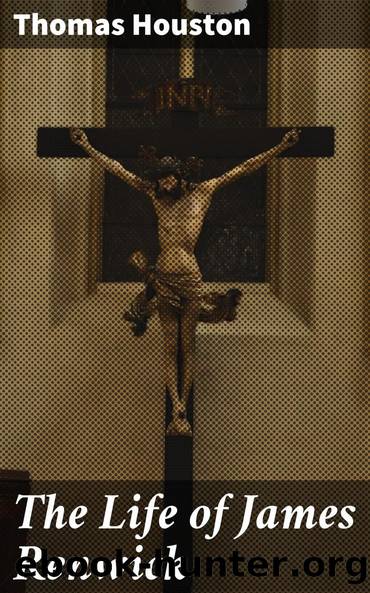The Life of James Renwick by Thomas Houston

Author:Thomas Houston [Houston, Thomas]
Language: eng
Format: epub
Tags: Fiction, Literary, Historical, General
ISBN: 9783752361780
Google: _M_zDwAAQBAJ
Publisher: BoD – Books on Demand
Published: 2020-07-28T03:28:40+00:00
FOOTNOTES:
1 [ Hist of Ch. of Scotland, vol. ii. p. 64]
2 [ Calvin and Geneva, vol. I., II.]
3 [ See AppendixâNote A.]
4 [ Dodds' "Fifty Years' Struggle," p. 275.]
5 [ See "Faithful Contendings."]
6 [ Dodds' "Fifty Years' Struggle," p. 275.]
APPENDIX.
Table of Contents
It has been common in some quarters of late, to speak of Renwick and his associates in testimony-bearing and suffering, as only contending against the unconstitutional and persecuting measures of the government of the Royal brothersâand to declare that, had they lived to witness the change of government which took place at the Revolution, they would have joyfully hailed it as the realization of their eager aspirationsâand would have incorporated readily with the national society. Thus, Dodds in his "Fifty Years' Struggle of the Scottish Covenanters,"âwhile acknowledging the important services rendered to the cause of the Prince of Orange, by the bold and resolute position taken by the Cameronians, represents Renwick, as not only "the last martyr of the Covenanting struggle," but also as "the Proto-martyr of the Revolution." He adds, "Like the shepherd overwhelmed in the snow-storm, he perished within sight of the door. The door of deliverance was speedily opened, on the arrival of William, in November, 1688." And, again, speaking of Cameron, Renwick, and the stricter Covenanters, he says, "So far, the REVOLUTION SETTLEMENTâin the main adopting what was universal, and rejecting what was exclusive, or over-grasping in their viewsâwas the consummation and triumph, civilly and politically, and to a large extent, ecclesiastically, of the FIFTY YEARS' STRUGGLE OF THE SCOTTISH COVENANTERS." These statements, though plausible, and such as seem likely to be readily embraced by those who have no relish for a full Covenanted testimonyâor who desire to maintain fellowship with corrupt civil and ecclesiastical systems, are liable to one fundamental and unanswerable objectionâthey are wholly unsupported by historical evidence. All pains were taken by Cameron and Renwick, in preaching and in their dying testimonies, and by the United Societies in their published declarations, to show that they testified not merely against the usurpation and blasphemous supremacy of the last of the Stuartsâbut likewise, principally, against all invasion of the Redeemer's royal prerogativesâand all departure from the scriptural attainments of the former happy Reformation. In nothing were they more decided than in testifying to the death, that the National Covenants were the oath of God, perpetually binding on all classes in the realmâ"the marriage tie," which no power on earth could dissolveâthat all departure from the principles of these federal deeds was sinful, and involved the land in the guilt of national apostacy and perjuryâand that the authority of the Scripture was supreme in constituting the national society, in enacting and administering the laws, and in regulating the lives and official acts of the rulers.
The Revolution Settlement, in both its civil and ecclesiastical departments, instead of being the exemplification and carrying forward of the work of the Second Reformationâfor the maintenance of which the Scottish martyrs shed their bloodâwas a deliberate abandonment of it, and was established in open opposition to its grand and distinguishing principles.
Download
This site does not store any files on its server. We only index and link to content provided by other sites. Please contact the content providers to delete copyright contents if any and email us, we'll remove relevant links or contents immediately.
| Buddhism | Christianity |
| Ethnic & Tribal | General |
| Hinduism | Islam |
| Judaism | New Age, Mythology & Occult |
| Religion, Politics & State |
Cecilia; Or, Memoirs of an Heiress — Volume 1 by Fanny Burney(31341)
Cecilia; Or, Memoirs of an Heiress — Volume 3 by Fanny Burney(30938)
Cecilia; Or, Memoirs of an Heiress — Volume 2 by Fanny Burney(30896)
The Secret History by Donna Tartt(16643)
Sapiens: A Brief History of Humankind by Yuval Noah Harari(13067)
Leonardo da Vinci by Walter Isaacson(11912)
The Radium Girls by Kate Moore(10914)
Sapiens by Yuval Noah Harari(4546)
The Wind in My Hair by Masih Alinejad(4427)
How Democracies Die by Steven Levitsky & Daniel Ziblatt(4407)
Homo Deus: A Brief History of Tomorrow by Yuval Noah Harari(4287)
Endurance: Shackleton's Incredible Voyage by Alfred Lansing(3852)
The Silk Roads by Peter Frankopan(3771)
Man's Search for Meaning by Viktor Frankl(3644)
Millionaire: The Philanderer, Gambler, and Duelist Who Invented Modern Finance by Janet Gleeson(3574)
The Rape of Nanking by Iris Chang(3522)
Hitler in Los Angeles by Steven J. Ross(3443)
The Motorcycle Diaries by Ernesto Che Guevara(3340)
Joan of Arc by Mary Gordon(3262)
